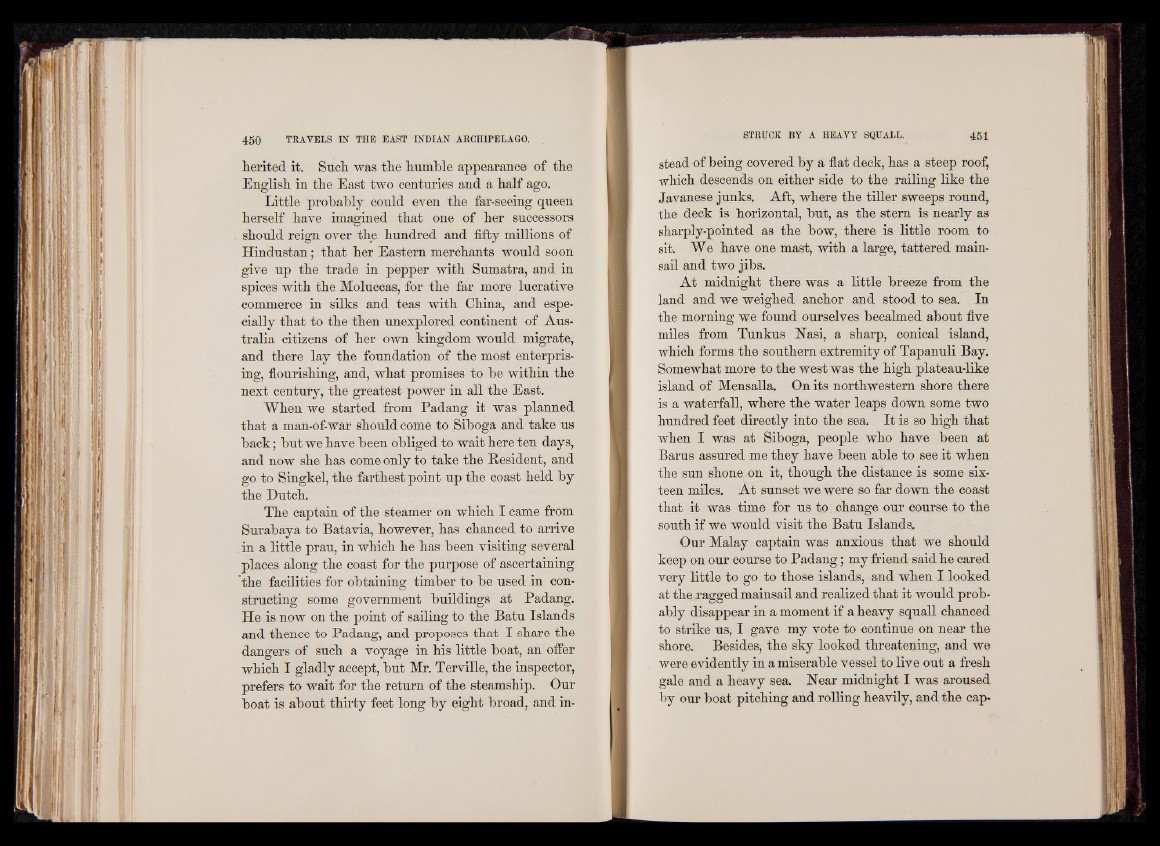
herited it. Sucli was the humble appearance of the
English in the East two centuries and a half ago.
Little probably could even the far-seeing queen
herself have imagined that one of her successors
should reign over the hundred and fifty millions of
Hindustan; that her Eastern merchants would soon
give up the trade in pepper with Sumatra, and in
spices with the Moluccas, for the far more lucrative
commerce in silks and teas with China, and especially
that to the then unexplored continent of Australia
citizens of her own kingdom would migrate,
and there lay the foundation of the most enterprising,
flourishing, and, what promises to be within the
next century, the greatest power in all the East.
When we started from Padang it was planned
that a man-of-war should come to .Siboga and take us
back; but we have been obliged to wait here ten days,
and now she has come only to take the Resident, and
go to Singkel, the farthest point up the coast held by
the Dutch.
The captain of the steamer on which I came from
Surabaya to Batavia, however, has chanced to arrive
in a little prau, in which he has been visiting several
places along the coast for the purpose of ascertaining
the facilities for obtaining timber to be used in constructing
some government buildings at Padang.
He is now on the point of sailing to the Batu Islands
and thence to Padang, and proposes that I share the
dangers of such a voyage in his little boat, an offer
which I gladly accept, but Mr. Terville, the inspector,
prefers to wait for the return of the steamship. Our
boat is about thirty feet long by eight broad, and instead
of being covered by a flat deck, has a steep roof,
which descends on either side to the railing like the
Javanese junks. Aft, where the tiller sweeps round,
the deck is horizontal, but, as the stern is nearly as
sharply-pointed as the bow, there is little room to
sit. We have one mast, with a large, tattered mainsail
and two jibs.
At midnight there was a little breeze from the
land and we weighed anchor and stood to sea. In
the morning we found ourselves becalmed about five
miles from Tunkus Nasi, a sharp, conical island,
which forms the southern extremity of Tapanuli Bay.
Somewhat more to the west was the high plateau-like
island of Mensalla. On its northwestern shore there
is a waterfall, where the water leaps down some two
hundred feet directly into the sea. It is so high that
when I was at Siboga, people who have been at
Barus assured me they have been able to see it when
the sun shone on it, though the distance is some sixteen
miles. At sunset we were so far down the coast
that it was time for us to change our course to the
south if we would visit the Batu Islands.
Our Malay captain was anxious that we should
keep on our course to Padang; my friend said he cared
very little to go to those islands, and when I looked
at the .ragged mainsail and realized that it would probably
disappear in a moment if a heavy squall chanced
to strike us, I gave my vote to continue on near the
shore. Besides, the sky looked threatening, and we
were evidently in a miserable vessel to live out a fresh
gale and a heavy sea. Near midnight I was aroused
by our boat pitching and rolling heavily, and the cap